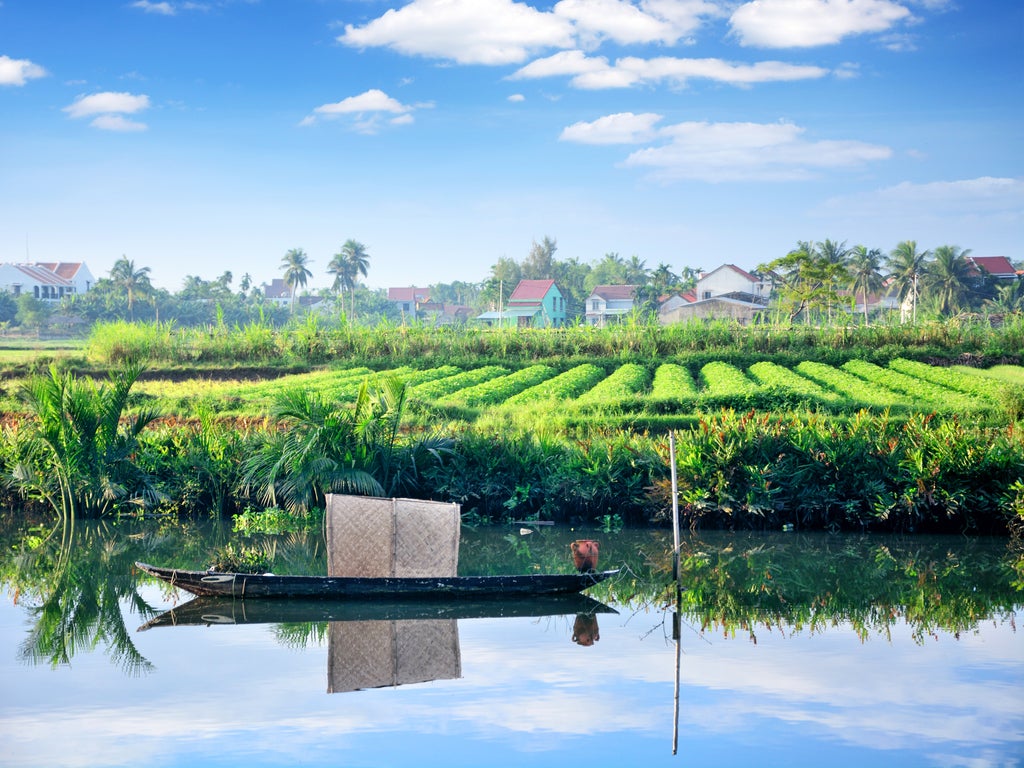
Passing the manicured edge of a neon-green rice paddy, cocooned in a fug of heat, we walked into a temple yard that was more disco flair than sombre religion. Spellbound, we watched a woman pray in front of an altar bursting with yellow flowers, guarded by two large, scarlet-snouted tiger figures, decked in cloaks of silver sequins trimmed with gold thread.
Inside a neighbouring temple, Buddha’s statue appeared to levitate amid lotus buds encased in glowing globes. Jungle rave? No, it was a temple dedicated to a legend of a cub found floating on a tangle of water hyacinth 300 years ago, which was rescued by a local couple.
“It is said that each year, on the anniversary of the death of its rescuers, the cub would bring an animal to a clearing for a ceremony in their memory,” Jack, our guide, told us. “Today, locals come to pray for love, protection, and business.”
We were on Tiger Island in Vietnam’s endlessly fascinating Mekong Delta, about to visit the very family-run businesses which might need such protection from a feline guardian. It was our first stop on a new cruise heading upstream on the Mekong River – from Can Tho, Vietnam, to Cambodia’s capital Phnom Penh. Our home for four nights was the Victoria Mekong, a purpose-built eco-boat - the first of its type on the Mekong, and the first to meander along an alternative, less-visited sliver of this heavily cruised waterway.
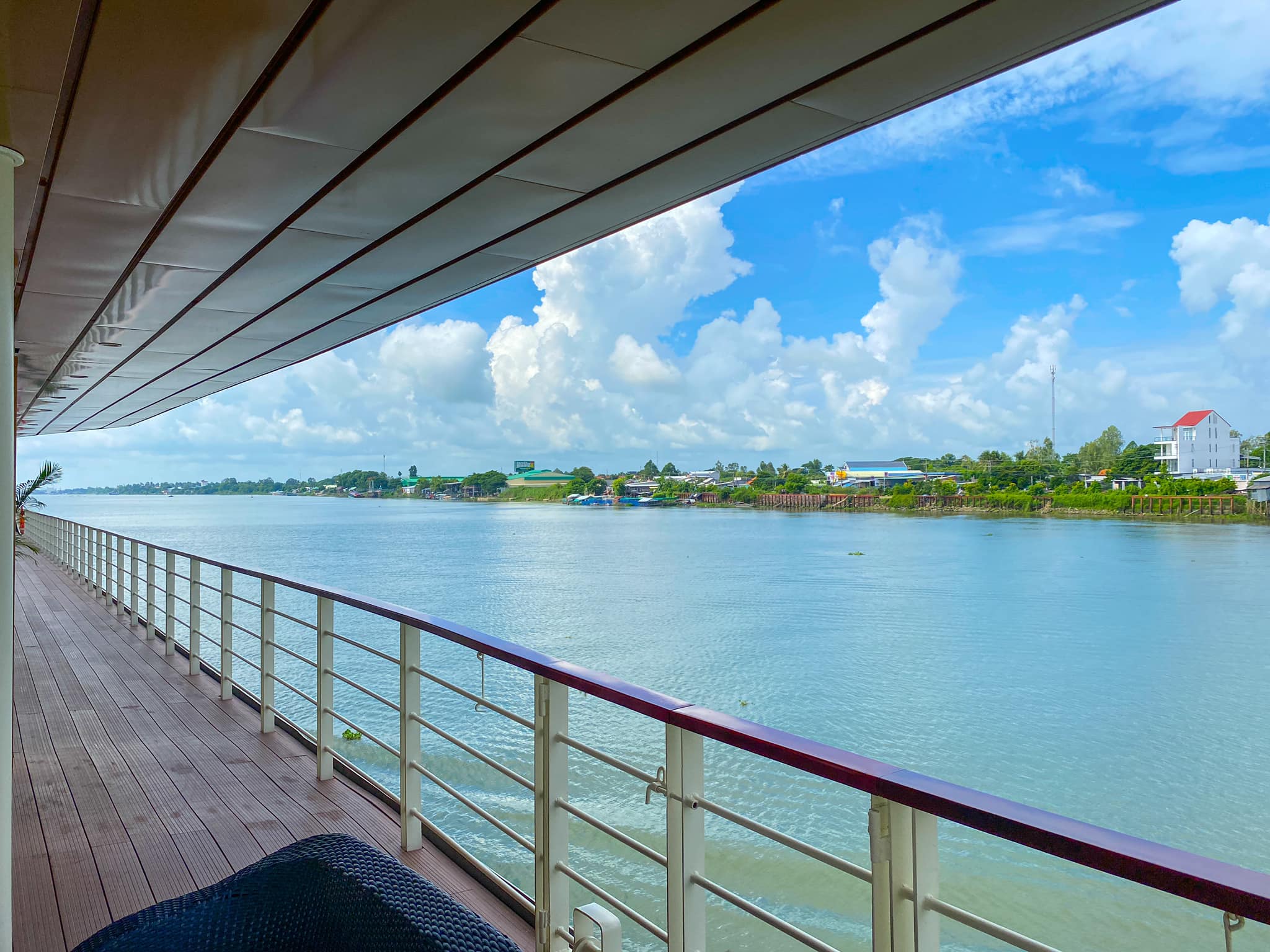
Most cruises here visit Sa Dec – home of French novelist Marguerite Duras, who penned The Lover about illicit passion in Indochina – as well as busy Chau Doc and pagoda-crammed Sam Mountain, spending a week on the river. Conversely, the 35-cabin Victoria leaves from Can Tho (a 3.5 hour drive from Ho Chi Minh City) and cruises along Song Hau – one of two main distributaries of Vietnam’s Mekong.
It’s a perfectly pitched four-night journey with trips to offbeat highlights of Vietnam’s Mekong Delta, offering soothing downtime after manic Saigon. You visit authentic communities with few other tourists in sight, gearing up for energetic, ascendant Phnom Penh and the monumental temples at Cambodia’s Angkor.
This is the only vessel in the delta using solar panels; it’s nearly entirely plastic-free and river water is processed to provide fresh water onboard
Landlubbers will appreciate how silently the boat glides along – practically shudder-free. Rooms are huge with a calming palette of taupe, rice paddy green and tanned wood, and come with floor-to-ceiling windows and balconies for soaking up the views.
More importantly, eco-credentials have been baked into its design. This is the only vessel in the delta using solar panels; it’s nearly entirely plastic-free (minus the shower cap); and river water is processed to provide fresh and drinking water onboard. She also travels slowly, at six to eight knots per hour (compared to 10 knots for other cruises). This curbing of speed reduces emissions and prevents waves which cause riverbank erosion.
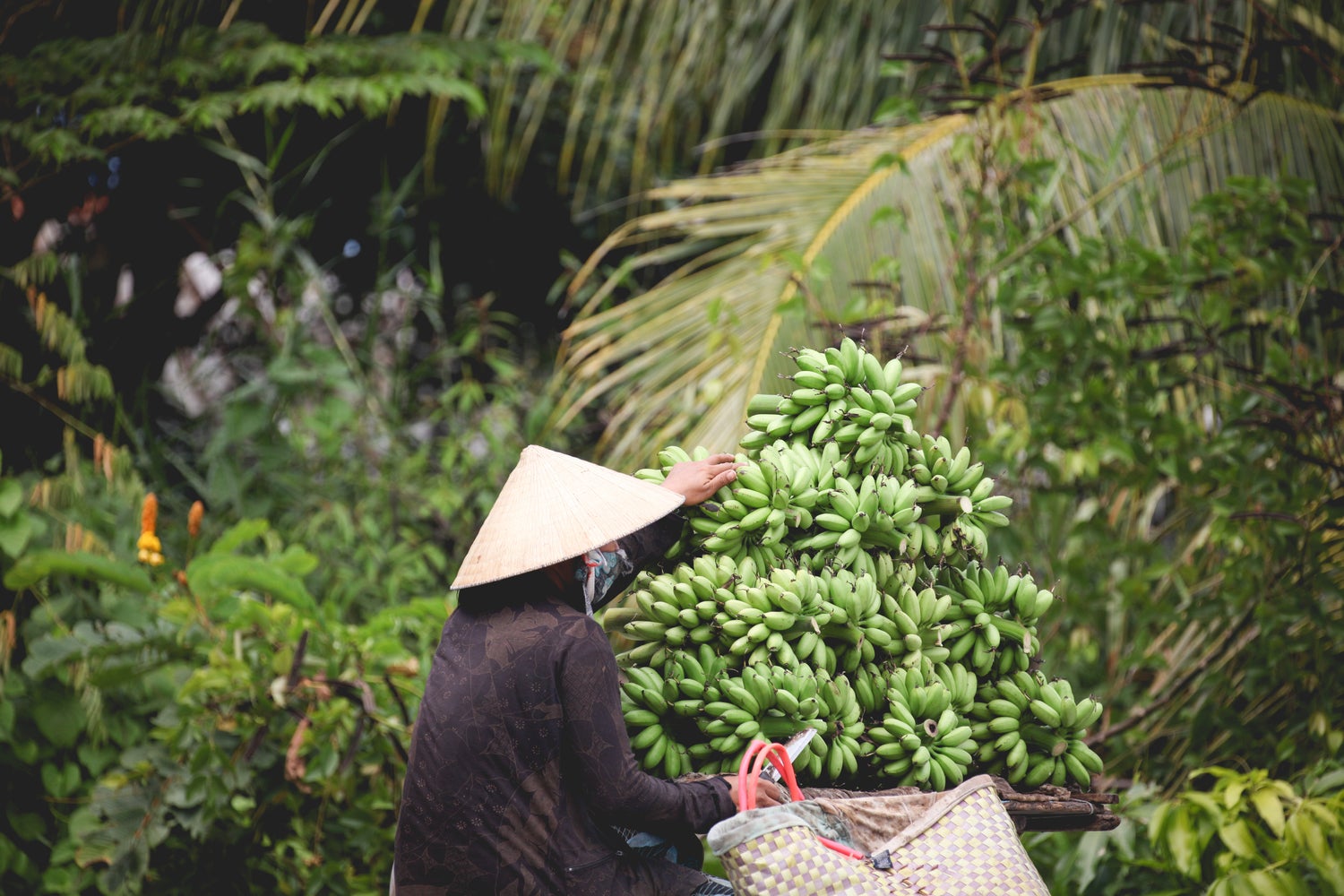
Vietnam’s Mekong Delta deceives: the jungle mantle is so thick with wild and fragrant plants it conceals much of the business of daily life. Beyond floating markets where families sell fruit and veg, and huge barges bulging with rice husks and painted with eyes to banish spirit monsters, what else was happening behind the rings of bamboo, banana plants and mango trees?
On Tiger Island, we were about to find out. It’s home to 20,000 busy souls living amid farm animals, barking dogs, and dozens of ceramic pooches, topping home gateposts and offering spiritual protection. We wandered past bonsai gardens, pink cactus, hillocks of coconuts, and telegraph poles wearing loudspeakers which creak to life with communist propaganda in early mornings. We watched the clickety-clack looms of a fishing-net factory and met a gent dipping bamboo sticks into incense powder, as well as a sculptor carving dragons and tiger out of longan fruit tree trunks for living room centrepieces.
Back on board, we lunched on young coconut and pork salad, mud crab and quail egg soup, and aromatic steamed fish with ginger and sautéed Chinese cabbage. Dessert and coffee we left to our next stop at Long Xuyen City. A conical-hatted seller at its floating market hooked her boat to our barge and poured thick black coffee into a cup, adding ice, then condensed milk. After this addictive caphe sua da, we gorged on banh chuoi chien – rice flour, coconut and sesame-battered bananas, made fresh by a seller dockside.
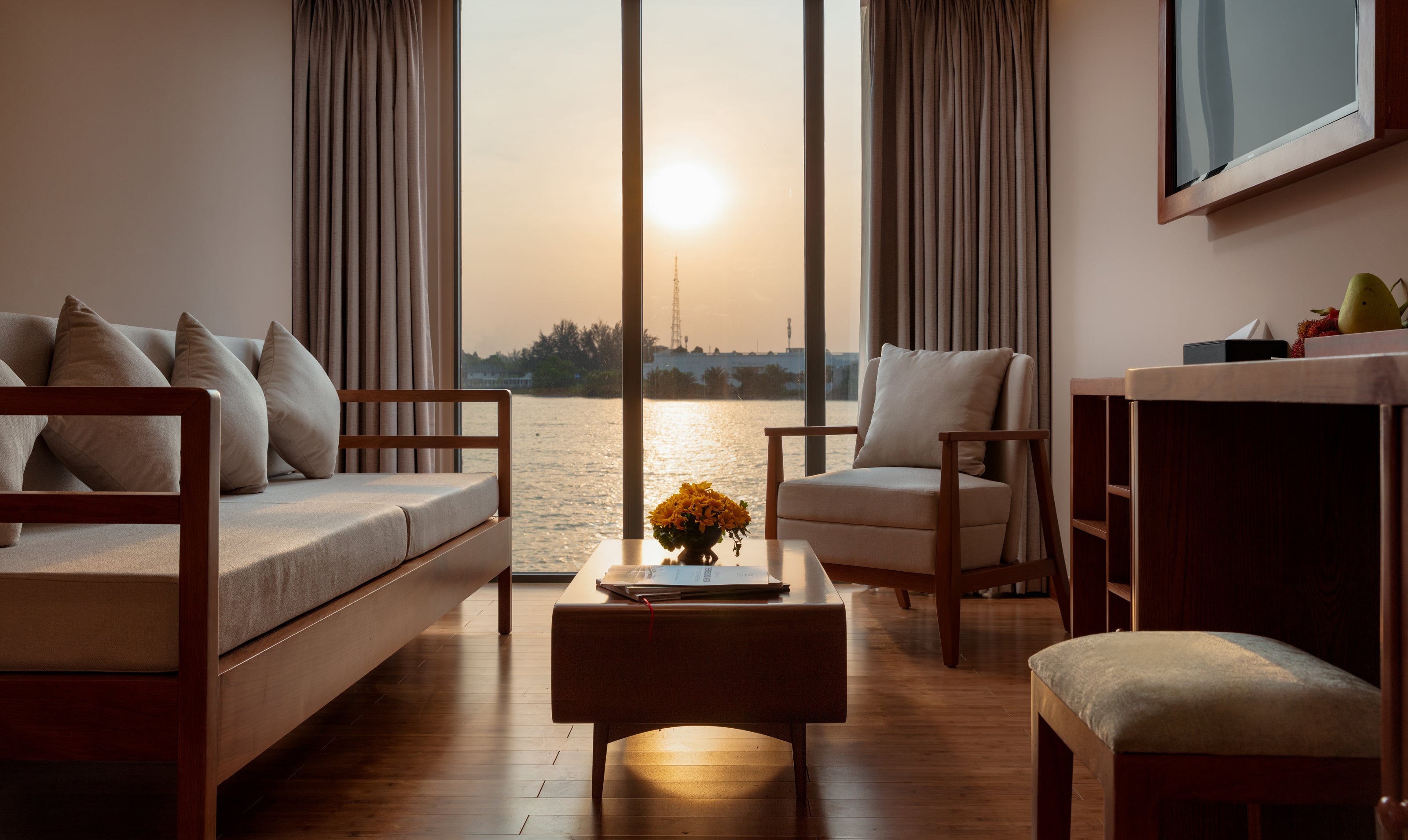
Both were a perfect pick-me-up for our next visit – a tour of Long Xuyen’s Museum. Its collection reflects both the region’s ethnic mix and chequered history. Khmer fishing traps, panels on the Hindu-ised Cham culture, and Vietnam War artefacts: bomb shreds, a bazooka, and – curiously – a metal comb in the shape of an aeroplane. Furniture embedded with sparkling mother-of-pearl figures of palms, fish, dragons, phoenixes, kingfishers and egrets portrayed mythical characters and the Mekong’s lush natural bounty.
A conical-hatted seller at its floating market hooked her boat to our barge and poured thick black coffee into a cup, adding ice, then condensed milk
That afternoon we headed away from the main waterways, to glimpse something resembling that mother-of-pearl menagerie. We found it at Tra Su, a paperbark forest threaded with waterways carpeted in perky duck weed. In golden afternoon light we boarded a small sampan boat through corridors of arching trees, oars slapping through milky-tea coloured water. The spell was shattered by a racket of storks and egrets, the flash of a tailorbird, and brilliant deep turquoise of a bronze-winged jacana on take-off.
Reflecting on the journey so far, I was full of appreciation for how much effort our guides had made to take us off the beaten path to meet communities and artisans in their place of work. Yes, we’d enjoyed luxurious hospitality along the way, but our hosts made sure we also reduced our carbon footprint by walking wherever possible, or boarding small boats and sturdy rickshaws on and around these delicate river islands.
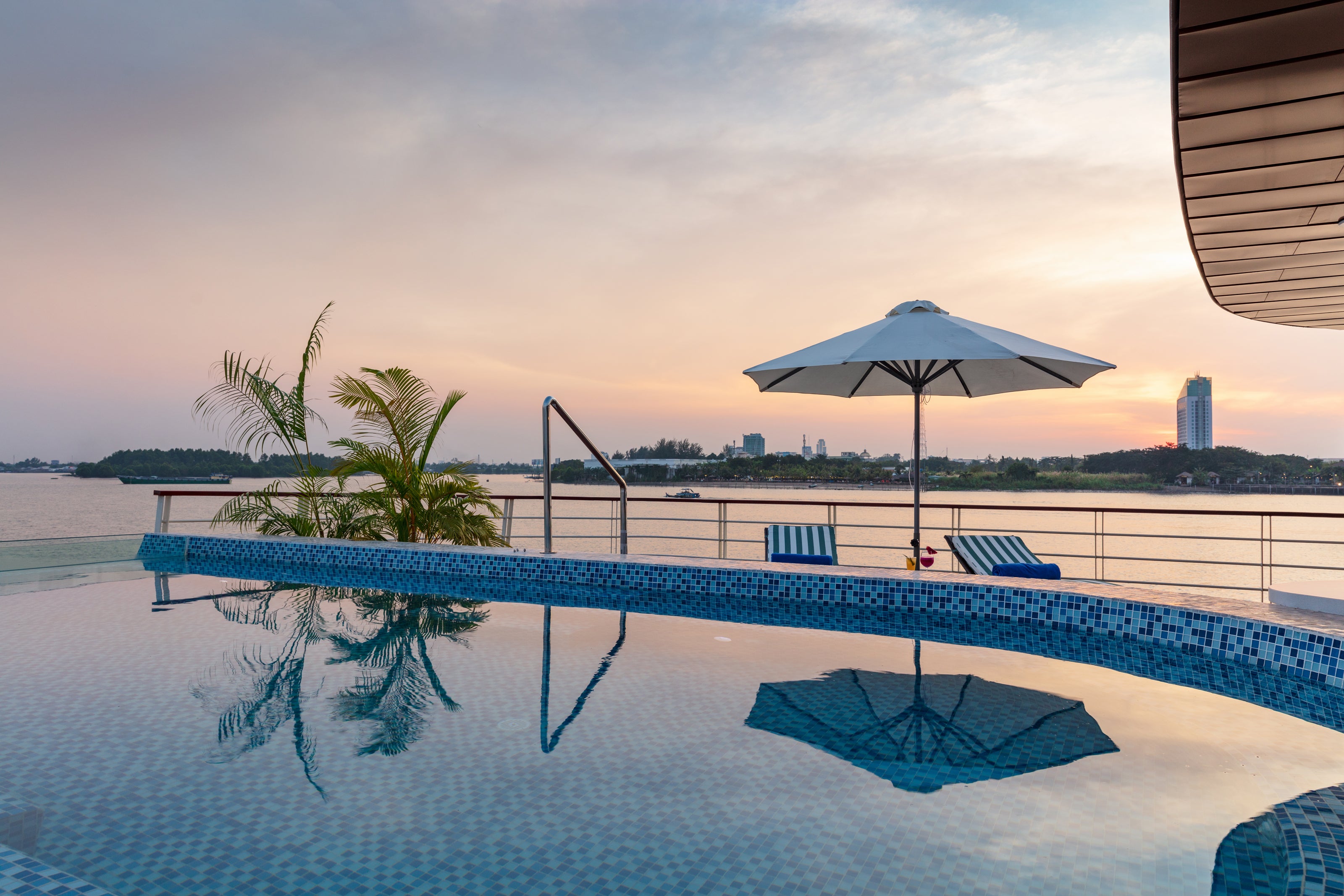
Vietnam’s nature had dazzled us and our next stop confirmed its allure. At Tan Chau we met weavers and dyers at a rare silk-making enterprise. Tám Lăng Silk is the only place in the Delta where the fabric is dyed with completely natural materials. The local mac nua fruit is used to stain huge silk sheets, which are dipped and dried 100 times over 30 days, then pounded with woodblocks to polish and create a lustrous ebony black.
Black silk is highly prized in Vietnam – not to mention by European fashion houses. Our guide told us that Angelina Jolie dressed in a Tám Lăng black silk gown at Disney’s Maleficent: Mistress of Evil premiere in 2019. Ker-ching! I thought about those prayers sent up at temples for successful business. Job done: Hollywood and haute couture money was cascading back into the delta.
Travel essentials
You can build the Victoria Mekong into a Vietnam trip with Audley Travel (01993 838140). A nine-night trip costs from £2,490 per person (based on two sharing) and includes one night in Ho Chi Minh City, one night at Victoria Can Tho, four nights on the Victoria Mekong Upstream cruise from Can Tho to Phnom Penh and one night at Palace Gate in Phnom Penh. The price includes return economy flights from the UK, transfers, hotel accommodation on a B&B basis and the cruise on a fully inclusive basis, as well as excursions. Or book directly: victoriamekong.com.

.png?w=600)





